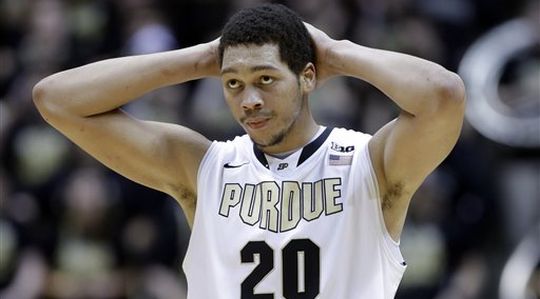Purdue’s Rebounding Problems Have Led to a Shaky Start
Posted by Jonathan Batuello on November 20th, 2013It hasn’t been the ideal start to the season for Purdue despite its 3-0 record. After a disappointing campaign last year, the Boilermakers were hopeful that they would make a big turnaround and push for an NCAA berth this season behind potential NBA Draft pick AJ Hammons and a talented group of sophomores and freshmen. So far, though, the team has struggled against two of its three opponents, sneaking by Northern Kentucky and Rider while blowing out Central Connecticut State. As my fellow Big Ten microsite writer Alex Moscoso pointed out earlier this week, Purdue has experienced the biggest drop in Pomeroy’s projection of expected wins this year, among the 12 Big Ten teams. The projection has fallen to 15-14 (6-12 Big Ten), yet the team has shown an increase in several notable metrics. The Boilermakers’ field goal percentage is nearly 1o points higher and its 3-point shooting is up over last year — as a result, the team’s effective field goal percentage has risen to 55.8 percent from 46.3 percent in 2012-13. It’s defense has also held steady, with opponents’ effective field goal percentage staying in the 45 to 46 percent range. So, what has caused Purdue to start the season so slowly and the metrics-based outlook to change? The biggest answer is that this team’s biggest strength last year — rebounding the basketball — has dropped dramatically.

AJ Hammons’ low minutes has hurt Purdue, but its drop in rebounding has been the biggest issue (AP).
Last year, Purdue ranked 10th nationally in rebounding; this season, Purdue has seen its rank drop to 90th, and the problem lies on the defensive backboard. average rebounds per game is nearly the same (39.4 to 40.3 RPG), the increase in Boilermaker possessions this season has this total looking worse. More possessions and more shots should mean more rebounds for a Purdue team that once thrived on the glass, but while it is rebounding at an elite level on the offensive end (43.5 percent, 13th best), it has struggled mightily to grab boards on the defensive glass (giving up 40.3 percent of those caroms, 309th in the nation). Part of this can be attributed to Hammons’ early struggles. He missed the first game due to a suspension and in the third game he sat on the bench for a large chunk of time due to foul trouble. In his two games he has averaged only 4.5 boards per game, a subtle but meaningful drop from 6.0 RPG last year. But even if his 40-minute average is still quite strong, as Purdue’s Associate SID notes below, it doesn’t mean much if your future draft pick doesn’t play.
Doing game notes… Per 40 minutes this year, A.J. Hammons is averaging 17.9 PPG, 12.4 RPG and 12.4 BPG. #TripleDouble
— Chris Forman (@ChrisForman12) November 19, 2013
Hammons’ reduced time on the floor has certainly hurt Purdue in in this area, but even his absence alone shouldn’t cause such a drop. Last season the team would often employ a small lineup with 6’5″ Raphael Davis at the four, and Jay Simpson’s redshirt freshman year has been solid so far with 5.3 rebounds per game. Granted, making more shots will led to fewer opportunities for offensive rebounds, but Purdue is still doing fine in that regard; Matt Painter needs his guards and forwards to crash the glass like they did last season on the defensive end. If Purdue can improve to at least a certain level of competency there, and continue to shoot as well as it has in the first few games, the NCAA Tournament won’t be as unreachable as it might otherwise appear after the team’s early struggles. The defensive board work must improve immediately, though, or Painter is going to find himself with a lot more close games against inferior competition than he no doubt desires.









































